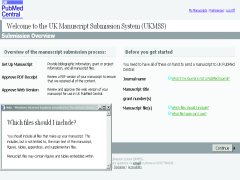Biomedical archive is first step towards national hub
Adam Bostanci introduces a new service to open up access to biomedical and health research in the UK

UK funders of biomedical and health research increasingly require that peer-reviewed articles arising from research they fund become freely available to maximise their impact. This trend has resulted in an exciting new project to create a national archive for such information. UK PubMed Central was launched in January 2007 and has already received hundreds of manuscripts from scientists working in biomedical and health research.
UK PubMed Central (UKPMC) is based on PubMed Central, the online archive platform developed by US National Institutes of Health (NIH). Like PubMed Central, UKPMC enables scientists to make their scientific articles freely available in a new national, subject-based repository. However, there is one aspect of the new archive that differs from its US sister. Whereas theNIHinthe USAmerely requests that research it funds be deposited in PubMed Central, many of UKPMC’s nine
funders – a group of government research funding agencies and leading medical research charities, brought together by the Wellcome Trust – make deposition in UKPMC a key requirement of their funding.
More than a mirror
The development and running of UKPMC is the responsibility of the British Library, the University of Manchester’s Information and Associated Services (MIMAS) and the European Bioinformatics Institute (EBI), who together won this contract in July 2006. Initially, UKPMC offers a UK-based version of the PubMed Central database, hosted on servers at MIMAS. The service offers access to a collection of more than 600,000 biomedical and life-science articles. In addition, UK PubMed Central has developed a manuscript submission system – at ukpmc.ac.uk/ukmss – to support the open-access policies of the UKPMC funders group. This enables scientists who receive research grants from this group, as well as publishers of their research, to add articles to the growing UKPMC collection.
The manuscript submission system comprises a user interface that allows researchers to upload their manuscript in a few simple steps. Researchers log into the system and enter information about their manuscript. Next, they upload the final version of the manuscript reflecting all changes arising from the peer-review process. Once the submission is complete, UK PubMed Central converts the manuscript into UKPMC-format, and, as soon as this is done, emails the principal investigator responsible for the research to approve the new UKPMC-manuscript. The article then becomes part of the UKPMC collection. The British Library runs this document management and publishing process.
In the context of broader open-access developments, the launch of UKPMC could also raise some questions in the scientific community. For example, inclusion of research publications in an online repository has to meet the terms under which the research has been published. My role at the British Library is to facilitate the engagement of the scientific community with these issues. The British Library also provides a helpdesk to support scientists who want to include their publications in UKPMC.
Supporting science
Rewarding as it has been to see hundreds of manuscripts submitted since the start of the year, this is just the beginning of UK PubMed Central. For the British Library, UKPMC presents one exciting step towards creating a digital environment to support scientific research, which is one of our strategic aims.
In the coming years, the British Library envisages the creation of a new hub for biomedical and health research information for the UK. UKPMC offers a unique opportunity to work directly with the UK-funded scientific research community in such developments. Plans include integrating the UKPMC article collection with molecular datasets and medical information resources. Technologies like text-mining will enable new types of research and discovery on the UKPMC platform.
All the UKPMC partners will be important in developing these services for the UK. The European Bioinformatics Institute near Cambridge, which is part of the European Molecular Biology Laboratory, will contribute biomedical domain knowledge and text-mining tools to integrate the research literature with the underlying bioinformatics databases. Bioinformatics expertise in the Faculty of Life Sciences at the University of Manchester will support the process of engaging with higher-education users. Future development of UKPMC will also be able to exploit the expertise based at the National Centre for Text Mining (NaCTeM) at the University of Manchester.
Adam Bostanci is engagement manager for UK PubMed Central at the British Library. Further details about UKPMC can be found at ukpmc.ac.uk.






